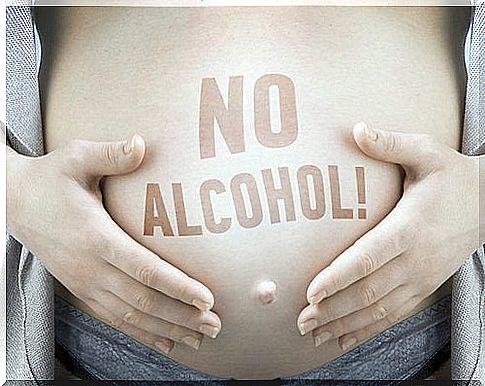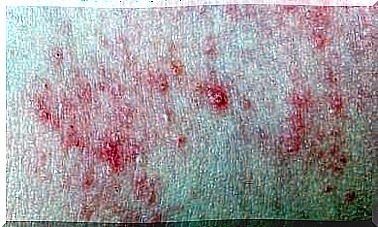What Is Fetal Alcohol Syndrome?

Fetal alcohol syndrome (FAS) occurs when the mother has consumed alcohol during pregnancy. It manifests itself in various problems that the baby can develop during its first months of life.
Although it has not been determined what is the minimum consumption in which anomalies begin to be detected, it has been proven that it also affects, to a great extent, the health of babies during pregnancy.
Why is alcohol bad for your health?
The consumption of alcohol is completely normalized in our societies and every time it begins at an earlier age. However, the negative consequences of the consumption of this substance for adults are nothing new. Among others, this type of drink can cause various damages, such as: alteration of the heart rhythm, lack of control of sugar levels, dehydration and digestive problems.
When a woman is pregnant, alcohol consumption can seriously affect the health of the baby for two simple reasons. First, because your body is not able to process that substance. Second, because it does not have the ability to eliminate all its waste. In other words, almost all of them are kept.
How is fetal alcohol syndrome evidenced?
The main symptoms of fetal alcohol syndrome are:
- Visual or hearing impairments.
- Delayed development milestones, as stated in an article published in the magazine “Nutrients”.
- Low birth weight and even malnutrition.
- Poor coordination of movements (detected in the long term).
- Poor growth (both before and after birth).

Most babies with this condition have facial malformations, according to a study published in 2018. The outstanding characteristics of this disorder are:
- Wide and flattened face.
- Small head circumference.
- Malformations in the ears.
- Extra wide and low nasal bridge.
- Small eyes with epicantal folds.
- Narrow palpebral fissures on the eyelids.
Detection and treatment of fetal alcohol syndrome
Logically, fetal alcohol syndrome must be diagnosed by a health professional. For its detection, the doctor will make some observations on the baby that, added to the mother’s testimony about her behavior during the pregnancy, will allow her to arrive at an answer.
The first thing you will see are the facial characteristics, since it is usually the most common trait of the little ones with this problem. If you have any of the abnormalities described above, it could be an indicator of fetal alcohol syndrome.
Second, the doctor will evaluate the baby’s growth parameters. Those who suffer from fetal alcohol syndrome often show delays in their developmental milestones, as well as difficulty coordinating movements and even deficiencies in their senses. This is because SAF has a direct impact on the central nervous system.
Indeed, ultimately, the doctor will make more specific studies to evaluate the CNS (central nervous system). In this way, it will analyze its structure (size and shape), its neurological functioning and the possible deficiencies that it could present.

Prevention as the best form of treatment
As we discussed before, it is not precisely determined what is the maximum amount of alcohol that a pregnant woman can ingest. Therefore, it is best to avoid it, especially in the first months of pregnancy.
In those cases in which the expectant mother has complications or even has alcohol withdrawal symptoms, it is best to seek professional help as soon as possible. In addition, the accompaniment and control of family members becomes essential in these situations.
Likewise, it is also important that the father refrain from alcohol consumption when trying to conceive a baby. On the one hand, because this will support the mother who cannot drink; and on the other, because it is believed that alcohol consumption by the father can also affect the future health of the child. However, this is still being investigated.
The importance of reducing alcohol consumption
Finally, it is necessary to emphasize that alcohol consumption is absolutely discouraged by doctors around the world. Regardless of the amount that is ingested. It is essential to always keep in mind that, what for a mother may be a simple snack, for the fetus can be a highly toxic substance that seriously damages its health.










